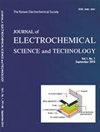Surface Engineering of GaN Photoelectrode by NH3 Treatment for Solar Water Oxidation
IF 3
4区 工程技术
Q3 ELECTROCHEMISTRY
Journal of electrochemical science and technology
Pub Date : 2023-09-27
DOI:10.33961/jecst.2023.00339
引用次数: 0
Abstract
Photoelectrochemical (PEC) water splitting is a vital source of clean and sustainable hydrogen energy. Moreover, the large-scale H 2 production is currently necessary, while long-term stability and high PEC activity still remain important issues. In this study, a GaN-based photoelectrode was modified by an additional NH 3 treatment (900°C for 10 min) and its PEC behavior was monitored. The bare GaN exhibited a highly crystalline wurtzite structure with the (002) plane and the optical bandgap was approximately 3.2 eV. In comparison, the NH 3 -treated GaN film exhibited slightly reduced crystallinity and a small improvement in light absorption, resulting from the lattice stress or cracks induced by the excessive N supply. The minor surface nanotexturing created more surface area, providing electroactive reacting sites. From the surface XPS analysis, the formation of an N-Ga-O phase on the surface region of the GaN film was confirmed, which suppressed the charge recombination process and the positive shift of E FB . Therefore, these effects boosted the PEC activity of the NH 3 -treated GaN film, with J values of approximately 0.35 and 0.78 mA·cm –2 at 0.0 and 1.23 V RHE , respectively, and an onset potential (V on ) of −0.24 V RHE . In addition, there was an approximate 50% improvement in the J value within the highly applied potential region with a positive shift of V on . This result could be explained by the increased nanotexturing on the surface structure, the newly formed defect/trap states correlated to the positive V on shift, and the formation of a GaO x N 1-x phase, which partially blocked the charge recombination reaction.氮化镓光电极NH3处理太阳能水氧化的表面工程
本文章由计算机程序翻译,如有差异,请以英文原文为准。
求助全文
约1分钟内获得全文
求助全文
来源期刊

Journal of electrochemical science and technology
ELECTROCHEMISTRY-
CiteScore
6.30
自引率
8.10%
发文量
44
期刊介绍:
Covering fields:
- Batteries and Energy Storage
- Biological Electrochemistry
- Corrosion Science and Technology
- Electroanalytical Chemistry and Sensor Technology
- Electrocatalysis
- Electrochemical Capacitors & Supercapcitors
- Electrochemical Engineering
- Electrodeposition and Surface Treatment
- Environmental Science and Technology
- Fuel Cells
- Material Electrochemistry
- Molecular Electrochemistry and Organic Electrochemistry
- Physical Electrochemistry
- Solar Energy Conversion and Photoelectrochemistry
 求助内容:
求助内容: 应助结果提醒方式:
应助结果提醒方式:


